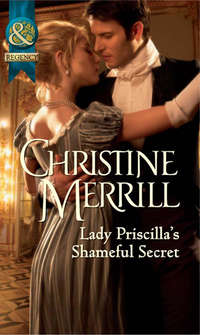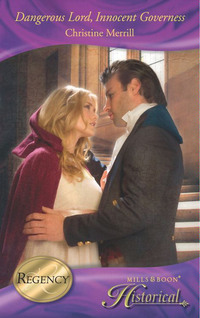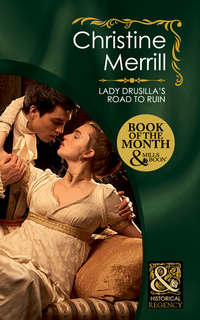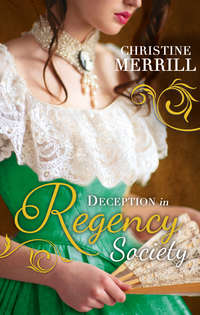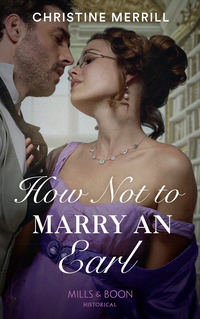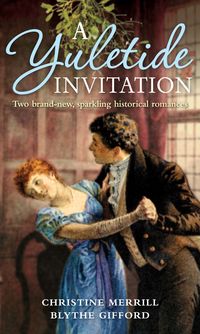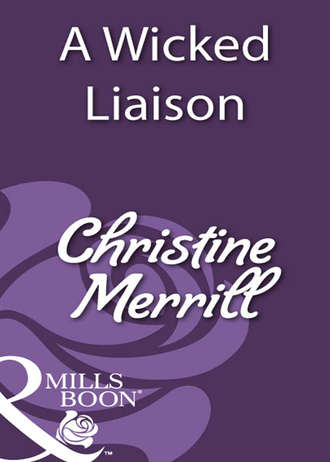
Полная версия
A Wicked Liaison

“Anything I might think to ask in payment, any request I might make, you would be willing to comply?”
She ignored the heat rising in her. “Yes.”
His voice dropped to a sensuous murmur, and she could feel the words dancing along her nerves. “Be warned, I have an extremely vivid imagination.”
Suddenly so did she. She closed her eyes tight and the fantasies that rose at the sound of his voice became more intense. Her blood sizzled as she imagined what it might be like to submit to the whims of a man who was little more than a stranger: a hardened criminal, accustomed to taking what he wanted.
“Anything you wish.”
A Wicked Liaison
Harlequin®Historical
Author Note
When I started writing nine years ago, I never imagined that my stories would find their way to Harlequin Books®. It is a source of great pride to know that my “imaginary friends” are in the care of a company whose history stretches back sixty years.
I hope you enjoy my story of Constance Townley, a lonely widow who is about to meet the man who will spoil her plans for a respectable remarriage. But how can she settle for a life without passion after Tony Smythe steals her heart?
I’ve grown quite fond of both Tony and Constance, who have been my close companions for several months. They are quite an exciting pair. When I sat down to write their story, I was never sure if I would be waltzing at Vauxhall or climbing into windows and picking imaginary locks. And together they do indeed have some wicked liaisons, and manage to live happily ever after.
CHRISTINE MERRILL
A Wicked LIAISON

Available from Harlequin®Historical and CHRISTINE MERRILL
The Inconvenient Duchess #821
An Unladylike Offer #862
Hallowe’en Husbands #917
“Master of Penlowen”
The Mistletoe Wager #925
A Wicked Liaison #953
DON’T MISS THESE OTHER
NOVELS AVAILABLE NOW:
#951 THE DISGRACEFUL MR. RAVENHURST—Louise Allen
Dowdy cousin Elinor’s family connections are extremely useful, but Theo Ravenhurst is convinced her drab exterior disguises a passionate nature. He’ll give Elinor the adventure she’s been yearning for—and in the process discover she has talents beyond his wildest imagination!
The latest tantalizing installment of Louise Allen’s
Those Scandalous Ravenhursts!
#952 MOUNTAIN WILD—Stacey Kayne
In the snow-dusted mountains of Wyoming, a blizzard brings a blond-haired cowboy and a blue-eyed mountain woman close. The two isolated souls, Garret Daines and Maggie Grace, share a common enemy. The bond they forge to overcome the threat against them is unbreakable—and when the storm is over, a connection lingers that is as wild as the mountains, yet seductively tender….
A love worth fighting for
#954 THE CONQUEROR’S LADY—Terri Brisbin
Giles Fitzhenry is a born warrior. Lady Fayth is a Saxon heiress, forced to marry this Breton conqueror. Though she yearns to be rid of him, a deep desire ignites each time she holds her new husband’s piercing gaze. Giles has conquered all: title, lands and respect. But the ultimate battle is for his new lady’s love—and her utter surrender.
The warrior’s unwilling wife…
To Maddie Rowe, editor extraordinaire.
You make this so much fun that I forget I’m working.
Contents
Chapter One
Chapter Two
Chapter Three
Chapter Four
Chapter Five
Chapter Six
Chapter Seven
Chapter Eight
Chapter Nine
Chapter Ten
Chapter Eleven
Chapter Twelve
Chapter Thirteen
Chapter Fourteen
Chapter Fifteen
Chapter Sixteen
Chapter Seventeen
Chapter Eighteen
Chapter One
Anthony de Portnay Smythe sat at his regular table in the darkest corner of the Blade and Scabbard pub. The grey wool of his coat blended with the shadows around him, rendering him almost invisible to the rest of the room. Without appearing to—for to stare at his fellows might prove suicidally rude—he could observe the other patrons. Cutpurses, thieves, petty criminals and transporters of stolen goods. Rogues to a man. And, for all he knew, killers.
Of course, he took great care not to know.
The usual feelings of being comfortable and in his element were unusually disconcerting. He dropped a good week’s work on to the table and pushed them towards his old friend, Edgar.
Business associate, he reminded himself. Although they had known each other for many years, it would be a mistake to call his relationship with Edgar a friendship.
‘Rubies.’ Tony sorted through the gems with his finger, making them sparkle in the light of the candle guttering on the table. ‘Loose stones. Easy to fence. You need not even pry them from the settings. The work has been done for you.’
‘Dross,’ Edgar countered. ‘I can see from here the stones are flawed. Fifty for the lot.’
This was where Tony was supposed to point out that they were investment-grade stones, stolen from the study of a marquis. The man had been a poor judge of character, but an excellent judge of jewellery. Then Tony would counter with a hundred and Edgar would try to talk him down.
But suddenly, he was tired of the whole thing. He pushed the stones further across the table. ‘Fifty it is.’
Edgar looked at him in suspicion. ‘Fifty? What do you know that I do not?’
‘More than I can tell you in an evening, Edgar. Far more. But I know nothing about the stones that need concern you. Now give me the money.’
This was not how the game was to be played. And thus, Edgar refused to acknowledge that he had won. ‘Sixty, then.’
‘Very well. Sixty.’ Tony smiled and held out his hand for the money.
Edgar narrowed his eyes and stared at Tony, trying to read the truth. ‘You surrender too easily.’
It felt like a long hard fight on Tony’s side of the table. Tonight’s dealings were just a skirmish at the end of the war. He sighed. ‘Must I bargain? Very well, then. Seventy-five and not a penny less.’
‘I could not offer more than seventy.’
‘Done.’ Before the fence could speak again, he forced the stones into Edgar’s hand and held his other hand out for the purse.
Edgar seemed satisfied, if not exactly happy. He accepted the stones and moved away from the table, disappearing into the haze of tobacco smoke and shadows around them, and Tony went back to his drink.
As he sipped his whisky, he reached into his pocket to remove the letter and his reading glasses. He absently polished the spectacles on his lapel before putting them on, then settled his chin in his hands to read.
Dear Uncle Anthony,
We are so sorry that you were unable to attend the wedding. Your gift was more than generous, but it does not make up in my heart for your absence on my most happy of days. I hardly know what to say in thanks for this and so many other things you have done for my mother and me over the years. Since Father’s death, you have been like a second father to me, and my cousins say the same.
It was good to see Mother finally marry again, and I am happy that Mr Wilson could be there to walk me down the aisle, but I cannot help but think you deserved the position more than he. I do not wish my marriage or my mother’s to estrange me from your company, for I will always value your wise counsel and your friendship.
My husband and I will welcome your visit, as soon as you are able.
Your loving niece, Jane
Tony stopped to offer a prayer of thanks for the presence of Mr Wilson. His sister-in-law’s discovery of Mr Wilson, and marriage to same, had stopped in its tracks any design she might have had to see Tony standing at the altar in a capacity other than loving brother or proud uncle.
Marriage to one of his brothers’ widows might have been expedient, since he had wished to involve himself financially and emotionally in the raising of their children, but the idea always left him feeling squeamish. Not an emotion he sought, when viewing matrimony. Seeing the widows of his two elder brothers well married, in a way that did not leave him legshackled to either of them, had been a load off his troubled brow.
And the wedding of young Jane was another happy incident, whether he could be there to attend or no. With the two widows and only niece comfortably remarried, all to gentlemen that met his approval, he had but to worry about the boys.
And, truth be told, there was little to worry about from either of his nephews, the young earl or his brother. Both were settled at Oxford, with their tuitions paid in full for the duration of their stay. The boys were sensible and intelligent, and appeared to be growing into just the sort of men that he could wish for.
And it left Tony—he looked at the letter in front of him. It left him extraneous. He had hoped, when at last he saw the family set to rights, to feel a rush of elation. He was free of responsibility and the sole master of his own life. Now that the time had come, it was without joy.
With no one to watch over, just what was he to do with his time? Over the years, he had invested wisely for the family as well as for himself, and his forays into crime had been less and less necessary and more a relief from the boredom of respectability.
Now that he lacked the excuse that there were mouths to feed and no money in the bank, he must examine his motivations and face the fact that he was no better than the common criminals around him. He had no reason to steal, save the need to feel the life coursing through him when he hung by drainpipes and window sills, fearing detection, disgrace or, worst of all, incarceration, and knowing every move could be his last.
No reason save one, he reminded himself. There was a slight movement in the heavy air as the door to the tavern opened and St John Radwell, Earl of Stanton, entered and strode purposefully towards the table.
Tony slipped the letter back into his pocket and tried not to appear too eager to have employment. ‘You are late.’ He raised his glass to the earl in a mocking salute.
‘Correction. You are early. I am on time.’ Stanton clapped Tony on the shoulder, took the seat that Edgar had vacated, and signalled the barman for a whisky. St John’s smile was mocking, but held the warmth of friendship that was absent from others Tony typically met while doing business.
‘How are things in the War Department?’
‘Not so messy as they were on the battlefield, thank the Lord,’ responded St John. ‘But still not as well as they could be.’
‘You have need of my services?’ Tony had no wish to let the man see how much he needed the work, but he itched to do something to take away the feeling of unease he experienced as he read the letter. Anything which might make him feel needed again.
‘I do indeed. Lucky for you, and most unlucky for England. We have another bad one. Lord Barton, known to his companions as Jack. He’s been a naughty boy, has Jack. He has friends in high places, and is not afraid to use those connections to get ahead.’
‘Dealing with the French?’ Anthony tried not to yawn.
St John grinned. ‘Better than that. Jack is no garden-variety traitor. He prefers to keep his crimes within the country. Recently, a young gentleman from the Treasury Department, while in his cups and gaming in the company of Lord Barton, managed to lose a surprising amount of money very quickly. Young men often do, when playing with Barton.’
‘Does he cheat?’ Tony asked.
‘I doubt he would balk at it, but that is not why the Treasury Department needs your help. The clerk’s efforts to win back what he had lost went as well as could be expected. He continued to gamble and lost even more. Soon he was facing utter ruin. Lord Barton applied pressure and convinced the man to debase himself further still, to clear his debt. He delivered to Barton a set of engraving plates for the ten-pound note. They were flawed and going to be destroyed, but they are near enough to perfect to make the notes almost undetectable.’
‘Counterfeiting?’ Tony could not but help admire the audacity of the man, even as he longed to ruin his plans.
St John nodded. ‘The clerk regretted his act almost immediately, but it was too late. Barton is now in a perfect position to destabilise the currency for his own benefit.’
‘And you need me to steal your plates back.’
‘You will be searching his home for an excessive number of ten-pound notes, paper, inks and, most especially, those plates. Use your discretion. Your utmost discretion, actually. This must not become a public scandal, but it must end immediately, before he begins circulating the money. We wish to break him quickly and quietly, so as not to upset the banks or the exchange.’
The earl dropped a full purse on the table. ‘As usual, half in advance and half when the job is completed. Feel free to take an additional payment from the personal wealth of Barton and any associates you might need to search. He has homes in London and Essex. But it has been less than a week since the theft. I doubt he has had time to get the plates out of the city.’ As an afterthought, Stanton added, ‘You had best search his mistress’s home, as well.’
‘A criminal’s mistress?’ Tony grinned. ‘You are sending me off to search the perfumed boudoir of some notorious courtesan? And paying me for the privilege.’ He rolled his eyes. ‘I fear what may become of me, if I am discovered by her. I had no idea that government service would hold such hardship.’
St John sighed with mock-aggravation. ‘I doubt there will be any such threat to your dubious virtue, Smythe. The lady is of good character, or was until Barton got his hooks into her. The widow of a peer. It is a shame to see such an attractive young thing consort with the likes of Jack. But one never knows.’ He scrawled an address down on a scrap of paper. ‘Her Grace, the Dowager Duchess of Wellford. Constance Townley.’
Tony felt the earth lurch under him, as it always did when her name rose unexpectedly in a conversation. But this time, it was compounded by a thrill of horror at hearing it in the current context.
Oh, my God, Connie. What has become of you?
He took a careful swallow of the whisky before speaking. Any hoarseness in his voice could be attributed to the harsh spirit in his glass. ‘The loveliest woman in London.’
‘So they say,’ St John responded. ‘The second-loveliest, perhaps. She is a particular friend of my wife and I’ve often had the opportunity to compare them.’
‘Night and day,’ remarked Tony, thinking of Constance’s shining black hair, her huge dark eyes, her pale skin, next to the fair beauty of Esme Radwell. In his mind, there was no comparison. But to be polite he said, ‘You are a fortunate man.’
‘As well I know.’
‘And you say the duchess has become Barton’s mistress.’
‘So I have been told. It is likely to become most awkward in my home, for I cannot very well encourage Esme to associate with her, if the rumours are true. But Constance is often seen in Barton’s company and he is most adamant about his intentions towards her in conversation with others. Either she is his, or soon will be.’
Tony shook his head in pretended sympathy, along with Stanton, and said, ‘A shame, indeed. But at least that part of the search will be of no difficulty. If the duchess is naïve enough to involve herself with Barton, then she might be unprepared to prevent my search and careless in hiding her part in the crime. When would you like results?’
‘As soon as can be managed safely.’
Tony nodded. ‘I will begin tonight. With Constance Townley, for she will be the weak link, if there is one. And you will hear from me as soon as I have something to tell.’
Stanton nodded in return. ‘I will leave you to it, then. As usual, do not fail me, and do not get caught. My wife expects you to dinner on Thursday and it will be damned difficult explaining to her if you cannot attend because I have got you arrested.’ He stood then, and took his leave, disappearing into the crowd and out the door.
Tony stared down into his glass and ignored the pounding blood in his ears. What was he to do about Constance? He had imagined her lying alone in the year following her husband’s death, and expected she would be quietly remarried to some honourable man soon after her period of mourning ended.
But to take up with Barton, instead? The thought was repellent. The man was a cad as well as a criminal. Handsome, of course. And well mannered to ladies. He appeared most personable, if you did not know the truth of his character.
But at thirty, Constance was no green girl to be dazzled by good looks and false charm. She might appear to be nothing more than a beautiful ornament, but Tony remembered the sharp mind behind the beauty. Even when she was a girl, she would never have been so foolish as to fall for the likes of Jack Barton. And the thought that she would willingly betray her own country…
He shook his head. He could not bring himself to believe it. If he must search her for Stanton, best to do it quickly and know the truth. And to do so, he must put the past behind him and clear his mind for the night’s work ahead of him. He finished the whisky, dropped a sovereign on the table for the barman, and went off into the night, to satisfy his curiosity as to the morals of the Dowager Duchess of Wellford.
Chapter Two
Tony did not need to refer to Stanton’s directions—he knew well the location of the house in London where the dowager resided. He’d walked by it often enough in daylight for the twelve months that she’d been in residence. Without intending to observe the place, he’d given himself a good idea of the layout of rooms by watching the activities in the windows as he passed.
Her bedroom would be at the back of the house, facing a small garden. And there would be an alleyway for tradesmen somewhere about. He’d never seen a delivery to the front door.
He worked his way down the row of townhouses, to a cross street and a back alley, counting in reverse until he could see the yellow brick of the Wellford house. As he went, he pulled a dark scarf from his pocket and wrapped it around his neck to hide the white of his shirtfront. His coat and breeches were dark, and needed no cover. Greys, blacks, and dark blues suited him well and blended with the shadows as he needed them to.
The wrought-iron gate was locked, but he found an easy toe-hold in the garden wall beside it. He swung himself to the top with no difficulty, crouching in the protection of a tree. Then, he gauged the distance of open ground to the house. Four paces to the rose-bush, another two to the edge of the terrace and up the ivy trellis at the corner of the house. And, please God, let it hold his weight, for the three storeys to the bedroom window would be no problem to climb, but damned tricky should he fall.
He was across the yard and up the ivy in a flash, happy to find the trellis anchored to the brickwork with stout bolts, and a narrow ledge beneath the third-storey window sill. He walked along it in the darkness, feet sure as though he was walking down a city street.
He stopped when he reached the window he suspected was hers. If it had been his house, he would have chosen another room for solitude, but this one had the best view of the garden. When he had known her, she had enjoyed flowers and he’d been told that the gardens at the Wellford manor had been most splendid because of the duchess’s attentions. If she wished to see the rose-bushes, she would choose this room.
He slipped a penknife under the frame, feeling along until he found the latch and felt it slide open with the pressure of the blade. Then he raised the sash a few inches, and listened at the gap.
There were no candles lit. The room was dark and quiet. He threw the window the rest of the way open, and listened again for an oath, an exclamation, anything that might indicate he had been heard. When nothing came, he stepped through the window and stood for a moment behind the curtain, letting his eyes adjust to the dim glow from the banked coals in the grate.
He was alone. He stepped further into the room, and was shocked to feel a wave of sadness and longing overtake him.
So it was not to be as easy as he’d hoped. The irrational jealousy he’d felt, when he’d heard she had found a protector so soon after leaving off her mourning, was burning away. He had hoped he could keep the anger fresh, and use it to protect his resolve when the time came to search her rooms. If she was no longer the innocent girl he remembered, but instead a traitorous whore, then she deserved punishment.
But he probed his heart and knew vengeance would be impossible, as would justice. If there was something to find in the room, he would find it.
And he would destroy it before St John Radwell and the government could ever see. He could not let Barton continue, but he would not let Constance be punished for her lover’s crimes. If there was a way to bring her out of it with a whole skin, he would do it, no matter the cost to his own reputation.
He scanned the room. He had chosen well. It was definitely a lady’s bedroom: large and high-ceilinged, decorated in rose with delicate furniture. Along the far wall, there was a soft and spacious bed.
Where the Duchess of Wellford entertained Jack Barton.
He turned away from it, looking anywhere but towards the bed.
He had expected to find a well-appointed boudoir, but this room was strangely empty. It was pretty enough, but almost monastic in its simplicity. On the walls there was no decoration. He ran his hands along the floral paper and felt for empty hooks. There should be sconces, there and there. And in the centre? A painting, perhaps, or a mirror with a gilt frame.
He strode across the room, to the wardrobe, threw open the doors, and was momentarily stunned by the scent of her. He closed his eyes and inhaled. Lavender. Had she always smelled this sweet? It had been so many years…
Eyes still shut, he navigated by touch through the dark wardrobe, his fingers playing along the back panels and feeling no spaces, no concealed latches. He patted the gowns and cloaks, feeling for lumps in pockets and finding none.
He opened his eyes again and went through the drawers, one at a time, feeling no false bottoms, nothing concealed between the dainties folded there. Silk and linen and fine Indian cotton. Things that had touched her body more intimately than he ever would. His fingers closed on a handkerchief, edged in lace and embroidered with a C. Impulsively, he took it and thrust it into his pocket, moving to the dresser to continue his search.
The Dowager Duchess of Wellford perched on the edge of her seat in her parlour, staring hopefully at the man on the couch next to her.
He was about to speak.
It was about time. He had been hinting for weeks.
She did her best to drum up a thrill of anticipation.
‘Constance, there is something I wish to speak to you about.’
‘Yes, Jeremy.’ Jeremy Manders was not her ideal, of course, but neither had her late husband been, and they had suited well enough.
‘We have known each other for a long time, since well before your husband passed. And I have always held you in high esteem.’
She smiled and nodded encouragement. ‘And I you. You were Robert’s good friend, and mine.’
‘But I will admit, even while Robert was alive, feeling the occasional touch of envy at his good fortune in having you, Constance.’


